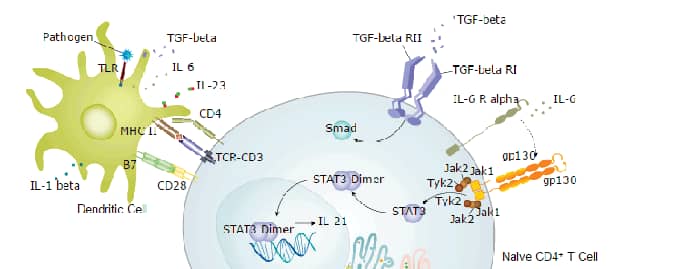Mouse B7-2/CD86 Antibody Summary
Customers also Viewed
Applications
Please Note: Optimal dilutions should be determined by each laboratory for each application. General Protocols are available in the Technical Information section on our website.
Scientific Data
 View Larger
View Larger
IL‑2 secretion Induced by B7‑2/CD86 and Neutralization by Mouse B7‑2/CD86 Antibody. Recombinant Mouse B7-2/CD86 Fc Chimera (Catalog # 741-B2) co-stimulates IL-2 secretion in the Jurkat human acute T cell leukemia cell line in the presence of PHA in a dose-dependent manner (orange line), as measured by the Human IL-2 Quantikine ELISA Kit (Catalog # D2050). IL-2 secretion elicited by Recombinant Mouse B7-2/CD86 Fc Chimera (0.5 µg/mL) and PHA (10 µg/mL) is neutralized (green line) by increasing concentrations of Rat Anti-Mouse B7-2/CD86 Monoclonal Antibody (Catalog # MAB741). The ND50 is typically 0.05-0.25 µg/mL.
Preparation and Storage
- 12 months from date of receipt, -20 to -70 °C as supplied.
- 1 month, 2 to 8 °C under sterile conditions after reconstitution.
- 6 months, -20 to -70 °C under sterile conditions after reconstitution.
Background: B7-2/CD86
B7-1 and B7-2, together with their receptors CD28 and CTLA-4, constitute one of the dominant costimulatory pathways that regulate T- and B-cell responses. Although both CTLA-4 and CD28 can bind to the same ligands, CTLA-4 binds to B7-1 and B7-2 with a 20‑100 fold higher affinity than CD28 and is involved in the down‑regulation of the immune response. B7-1 is expressed on activated B cells, activated T cells, and macrophages. B7-2 is constitutively expressed on interdigitating dendritic cells, Langerhans cells, peripheral blood dendritic cells, memory B cells, and germinal center B cells. Additionally, B7-2 is expressed at low levels on monocytes and can be up‑regulated through interferon gamma. B7-1 and B7-2 are both members of the immunoglobulin superfamily. Mouse B7-2 is a 309 amino acid (aa) protein containing a putative 23 aa signal peptide, a 221 aa extracellular domain, a 21 aa transmembrane domain, and a 44 aa cytoplasmic domain. Mouse B7-2 and B7-1 share 28% amino acid identity. Mouse and human B7-2 share 50% amino acid identity. However, it has been observed that both human and mouse B7‑1 and B7‑2 can bind to either human or mouse CD28 and CTLA-4, suggesting that there are conserved amino acids which form the B7-1/B7-2/CD28/CTLA-4 critical binding sites.
- Azuma, M. et al. (1993) Nature 366:76.
- Freeman, G.J. et al. (1993) Science 262:909.
- Freeman, G. et al. (1991) J. Exp. Med. 174:625.
- Selvakumar, A. et al. (1993) Immunogenetics 38:292.
- Chen, C. et al. (1994) J. Immunol. 152:4929.
- Freeman, G.J. et al. (1993) J. Exp. Med. 178:2185.
Product Datasheets
Citation for Mouse B7-2/CD86 Antibody
R&D Systems personnel manually curate a database that contains references using R&D Systems products. The data collected includes not only links to publications in PubMed, but also provides information about sample types, species, and experimental conditions.
1 Citation: Showing 1 - 1
-
Effective induction of immune tolerance by portal venous infusion with IL-10 gene-modified immature dendritic cells leading to prolongation of allograft survival.
Authors: Zhang M, Wang Q, Liu Y, Sun Y, Ding G, Fu Z, Min Z, Zhu Y, Cao X
J. Mol. Med., 2004-04-01;82(4):240-9.
Species: Mouse
Sample Types:
Applications: Flow Cytometry
FAQs
No product specific FAQs exist for this product, however you may
View all Antibody FAQsReviews for Mouse B7-2/CD86 Antibody
There are currently no reviews for this product. Be the first to review Mouse B7-2/CD86 Antibody and earn rewards!
Have you used Mouse B7-2/CD86 Antibody?
Submit a review and receive an Amazon gift card.
$25/€18/£15/$25CAN/¥75 Yuan/¥2500 Yen for a review with an image
$10/€7/£6/$10 CAD/¥70 Yuan/¥1110 Yen for a review without an image





















